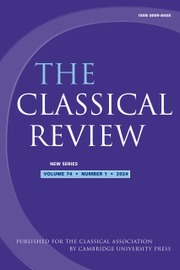Refine search
Actions for selected content:
60621 results in Classical studies (general)

The Classical Review
- Published for: The Classical Association
-
- Journal
-
- Get access
- Contains open access
-
Classics after Antiquity
- Series
-
Yale Classical Studies
- Series
Ludwig Huber: Religiöse und politische Beweggründe des Handelns in der Geschichtsschreibung des Herodot. Tübingen diss.) Pp. x+211. Privately printed: obtainable from the author at Lins-Oetker-Str. 18, Bielefeld. Paper, DM. 12.
-
- Journal:
- The Classical Review / Volume 19 / Issue 3 / December 1969
- Published online by Cambridge University Press:
- 27 February 2009, pp. 383-384
- Print publication:
- December 1969
-
- Article
- Export citation
R. Henry: Photius, Bibliothéque. Texte établi et traduit. Tome v (Codices 230–241). (Collection By zantine.) Pp. 230 (text double). Paris: Les Belles Lettres, 1967. Paper.
-
- Journal:
- The Classical Review / Volume 19 / Issue 3 / December 1969
- Published online by Cambridge University Press:
- 27 February 2009, pp. 377-378
- Print publication:
- December 1969
-
- Article
- Export citation
H. Steneker: Πειθος δημιονργία. Observations sur la fonction du style dans le Protreptique de Clémentd' Alexandrie. (Graecitas Christianorum Primaeva, fasc. 3.) Pp. xxiv+174. Nijmegen: Dekker & Van de Vegt, 1967. Paper, fl. 19.50.
-
- Journal:
- The Classical Review / Volume 19 / Issue 3 / December 1969
- Published online by Cambridge University Press:
- 27 February 2009, pp. 376-377
- Print publication:
- December 1969
-
- Article
- Export citation
Studii Clasice, x (1968). Pp. 392. Bucarest: Editura Academiei Republicii Socialiste România, 1968. Cloth, lei 40.
-
- Journal:
- The Classical Review / Volume 19 / Issue 3 / December 1969
- Published online by Cambridge University Press:
- 27 February 2009, p. 394
- Print publication:
- December 1969
-
- Article
- Export citation
M. M. Kokolakis: Ῥιανὸς ὁ Ωρής Pp. 38. Athens, 1968. Paper.
-
- Journal:
- The Classical Review / Volume 19 / Issue 3 / December 1969
- Published online by Cambridge University Press:
- 27 February 2009, pp. 373-374
- Print publication:
- December 1969
-
- Article
- Export citation
Hans Julius Wolff: Demosthenes als Advokat. (Schriftenreihe der juristischen Gesellschaft e. V. Berlin, 30.) Pp. 26. Berlin: de Gruyter, 1968. Paper, DM. 6.
-
- Journal:
- The Classical Review / Volume 19 / Issue 3 / December 1969
- Published online by Cambridge University Press:
- 27 February 2009, p. 376
- Print publication:
- December 1969
-
- Article
- Export citation
Terence, Eunuchus 189–206
-
- Journal:
- The Classical Quarterly / Volume 19 / Issue 2 / December 1969
- Published online by Cambridge University Press:
- 11 February 2009, pp. 314-319
- Print publication:
- December 1969
-
- Article
- Export citation
Homeric Echoes in Valerius Flaccus' Argonautica
-
- Journal:
- The Classical Quarterly / Volume 19 / Issue 2 / December 1969
- Published online by Cambridge University Press:
- 11 February 2009, pp. 362-366
- Print publication:
- December 1969
-
- Article
- Export citation
Archaeologia Homerica: Die Denkmäler und das frühgriechische Epos. Band ii, Kap. A–B: Spyridon Marinatos: Kleidung, Haar- und Barttracht. Pp. vii+106; 12 plates, 25 figs. Band ii, Kap. K: Robert James Forbes: Bergbau, Steinbruchtätigkeit und Hüttenwesen. Pp. 43, 16 figs. Göttingen: Vandenhoeck & Ruprecht, 1967. Paper, DM. 27, 9.80.
-
- Journal:
- The Classical Review / Volume 19 / Issue 3 / December 1969
- Published online by Cambridge University Press:
- 27 February 2009, pp. 386-387
- Print publication:
- December 1969
-
- Article
- Export citation
Emendations of Seneca ‘Rhetor’
-
- Journal:
- The Classical Quarterly / Volume 19 / Issue 2 / December 1969
- Published online by Cambridge University Press:
- 11 February 2009, pp. 320-329
- Print publication:
- December 1969
-
- Article
- Export citation
A New Florus - Paul Jal: Florus, Æuvres. Texte établi et traduit. (Collection Budé.) 2 vols. Pp. clxxi+154 (double), 156 (double). Paris: Les Belles Lettres, 1967. Paper.
-
- Journal:
- The Classical Review / Volume 19 / Issue 3 / December 1969
- Published online by Cambridge University Press:
- 27 February 2009, pp. 303-305
- Print publication:
- December 1969
-
- Article
- Export citation
Ends, Means, and Values - Gordon Williams: Tradition and Originality in Roman Poetry. Pp. x+811. Oxford: Clarendon Press, 1968. Cloth, £4. 10s. net.
-
- Journal:
- The Classical Review / Volume 19 / Issue 3 / December 1969
- Published online by Cambridge University Press:
- 27 February 2009, pp. 294-298
- Print publication:
- December 1969
-
- Article
- Export citation
The Ionides Gem Collection - John Boardman: Engraved Gems: The Ionides Collection. Pp. 114; 9 colour, 130 black and white plates. London: Thames & Hudson, 1968. Cloth, £5. 5s. net.
-
- Journal:
- The Classical Review / Volume 19 / Issue 3 / December 1969
- Published online by Cambridge University Press:
- 27 February 2009, pp. 346-347
- Print publication:
- December 1969
-
- Article
- Export citation
La Paix Romaine - Paul Petit: La Paix romaine. Pp. 414. Paris: Presses Universitaires de France, 1967. Boards, 26 fr.
-
- Journal:
- The Classical Review / Volume 19 / Issue 3 / December 1969
- Published online by Cambridge University Press:
- 27 February 2009, pp. 334-337
- Print publication:
- December 1969
-
- Article
- Export citation
